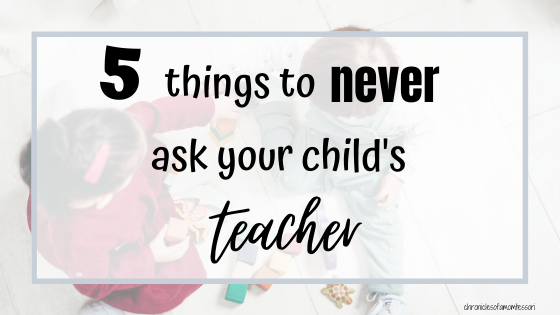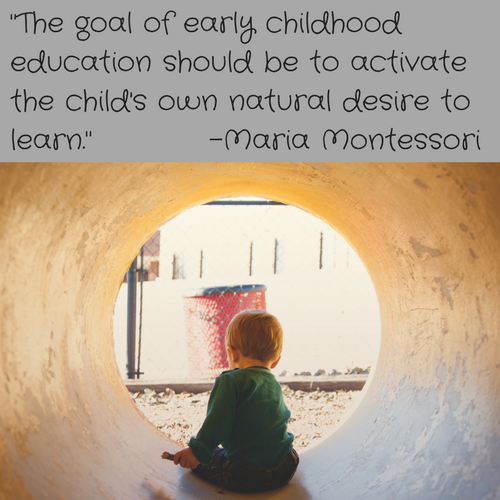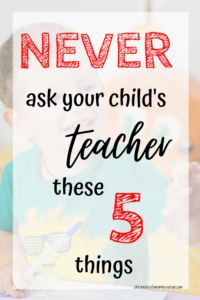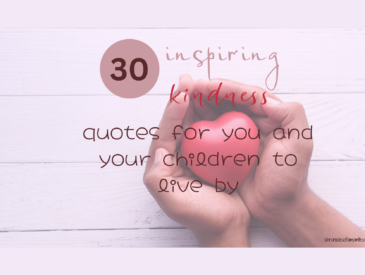Being a teacher is hard enough…
Give your child’s teacher a break
Parenting is not easy either
Being a parent and putting your child in school for the first time is not an easy thing to do. I know how hard it can be for parents to leave their child for the first time at a child care center or daycare. I remember when I had my first daughter, I stayed home with her until she was about 18 months old. When I landed my first teaching job as an Assistant at a Montessori school, I had the opportunity to take her with me. She was in the Toddler classroom, while I was in the Preschool classroom. Dropping her off with complete strangers was just as traumatizing for her as it was for me. She cried; I cried…I tried going to check on her, and I was not allowed. The teachers in the room said it was best for me not to let her see me, as it would make her adjustment even harder. The hardest thing for me to do as a mom was to trust in the teachers and their professional abilities and opinions. But in order for your child to have a successful time in school, you must trust and believe in your child’s teacher(s). It is not easy to do, but it is necessary for your child’s educational journey.
Fast forward to when she moved into the Preschool and a lot of academics began to be introduced. I wanted her to learn everything possible, learn her shapes, write her name, read at an early age, know all of her numbers, and be one of the smartest children in the classroom. I wanted to see instant results and her progress lined out, but her teachers informed me that it is just not that easy. I was confused and frustrated, and as I learned more about child development, what they were telling me started to make sense. I knew to trust in her teachers and in my child’s inner abilities and development. I knew to trust in what they do and the process. So you see? I get it, I understand as a parent that you want the best for your child, and want your child to learn as much as possible.
With all this being said, as a teacher, I understand how my daughters teachers felt at the time. When curious about your child’s progress, ask specific questions about their development. There are a few questions that you should NEVER ask your child’s teacher. Don’t get me wrong, there are plenty of other things that you CAN ask your child’s teacher, but there are 5 questions that educators prefer you never ask…
5 things to NEVER ask your child’s teacher
Try to avoid asking these questions when seeking information regarding your child’s learning
1.How is my child doing?
Most times, this is asked at a time when the parent is on their way to work and don’t have a lot of time to get this answered accurately. This question is too generic and extremely hard to answer. It is a very broad question, and without having a more specific question, the answer you get may also be broad. When I get asked this question, I commonly answer with, “Good.” I am unsure of exactly what they are asking to know about, so the generic question unfortunately gets a generic answer. Instead of asking “How is my child doing?”, you could ask, “How is my child doing on learning their numbers?” or “How is my child doing on writing their name?”.
2. Why isn’t my child learning to…?
This question is one of the hardest questions to answer. I understand that parents we have an idea of what we feel our kids should be learning and at what pace. The one thing that most parents don’t realize is that children develop at their own pace. We can expose them to various activities and lessons, but they will master these skills when they are ready to. It cannot be rushed or forced, and it is important for educators and parents to follow the development of the child.
3. Is my child behind at all for their age?
The answer to this question is one that many parents do not like to hear. It is difficult to pre-determine exactly what a child will have mastered by a certain age. The answer to this question goes back to the previous question. If you follow the development of the child, then they are not behind for their age. Children advance at different stages and ages, and children will progress at a pace that is right for them. It is sometimes difficult for parents to accept this answer, but reassuring them of their child’s natural abilities to learn helps to put them at ease.
4. Where is my child in comparison to other kids their age?
The worst thing a parent can do is to compare their child to other children. It is a common practice, but it does nothing except put undue pressure on the child. When parents compare their child to other children, it leads to them setting unrealistic goals for their child, which they, in most cases, cannot reach. Again, remember that each child develops at their own individual pace, and will progress at their own stage. Some children reach some milestones at earlier ages than others, but it is important to remember that it is not important when they reach the milestone just as long as they reach it.
5. Is there anything I can work on at home?
If your child is in preschool, you are entrusting the school educators to teach your child. You are leaving them in our care so that we can teach them things like academics, socialization skills, and following directions to name a few. As an educator, it is my responsibility to teach every child skills that will be needed later on in their educational journey. I teach them based on their personal developmental needs and abilities, and try to instill a love of learning in every child that comes through my classroom.
I feel that having parents work on skills or tasks at home may overwhelm children. I encourage parents to leave the teaching to us educators in the classroom setting, and just let their children play, relax, and enjoy quality time with them while at home. There will be plenty of time in the future when they will have tons to work on at home later on in school.
I have been teaching for over 20 years, and these 5 questions are questions that are always asked by parents. As a professional educator, who has studied child development, I feel that letting children develop naturally at their own pace they will reach their full potential. As Maria Montessori said, “Free the child’s potential, and you will transform him into the world.”
What to take from this
As parents, I know that you want to know and worry about how your child is doing. But please place trust in your child’s teacher and know that they will communicate with you any concerns that may arise. They are in no way going to keep any information from you regarding your child’s development or learning, so remembering this will allow them to focus on the most important thing…your child!
Trust me, your child’s teacher will thank you for not asking these 5 questions!
Until next time!











I am in the middle of writing a post on how to communicate effectively with your child’s teacher. I agree with you that many of the questions that parents ask cannot be answered on the spur of the moment. Parents need to take the time to meet with the teacher at a mutually convenient time.
However, I think that the teacher can help the parent by saying something like: “The answer to your question deserves more time than either one of us has right now. Would you like to make a time to come in or speak on the phone? As educators, we can honor parents questions but at the same time help them see that more time is needed to give thoughtful consideration to their questions.
Yes! When I was teaching kindergarten, I couldn’t stand when parents asked, “How is my child doing?” It’s such a broad question! But I also would be annoyed if parents wanted a lengthy discussion without an appointment. As you know, teachers have very limited planning time and my time away from students was precious. As long as you schedule with me in advance, we could talk about anything.
I’m a high school teacher who understands very little about early childhood development. I had to leave it to the professionals. I also gained A LOT of respect for those in early childhood and elementary because they taught my children how to read 🥰